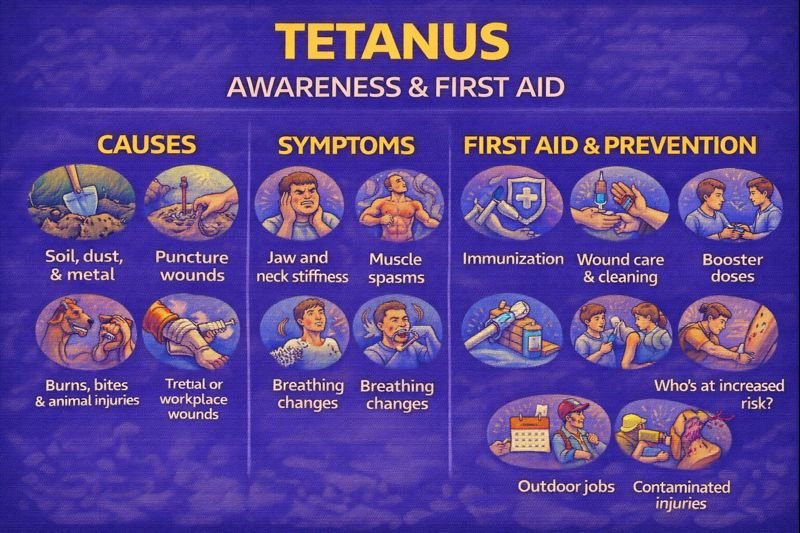Tetanus: Causes, Symptoms & Prevention Awareness (Canada)

Why it matters for first aid & workplace safety
Tetanus is rare in countries with routine vaccine programs, including Canada, but awareness is still important in situations where:
-
Cuts or puncture injuries involve soil, dirt, metal, or outdoor equipment
-
Work includes landscaping, agriculture, construction, or animal environments
-
Travel occurs to regions with lower immunization access
-
Booster history is unknown or incomplete
Workplace first aid courses typically include wound care awareness that relates to tetanus exposure risk.
Scenario (mild, realistic, non-alarmist)
During a backyard renovation, Mateo scraped his hand on an old garden stake. The wound was cleaned and covered, and a family member asked about his last tetanus booster. Since he wasn’t sure, he booked an appointment to check his immunization status and received guidance from a health professional.
What causes tetanus?
Tetanus is caused by the bacterium Clostridium tetani, which can be found in:
-
Soil and dust
-
Animal environments (barns, farms, yards)
-
Outdoor tools and old metal surfaces
The bacteria can enter the body through:
-
Cuts or scrapes
-
Certain burns
-
Animal-related injuries
-
Outdoor or workplace injuries
Tetanus does not spread from person to person.
Symptoms to watch for
Symptoms typically appear within several days after exposure and may include:
-
Stiffness in the jaw or neck
-
Difficulty swallowing
-
Muscle spasms or tightness affecting the torso or back
-
Changes in breathing pattern
-
Fatigue or discomfort
-
Fever or sweating
-
Changes in heart rate or blood pressure
Symptoms can progress quickly and require medical attention.
Diagnosis & medical assessment
Tetanus is diagnosed by:
-
Reviewing symptoms
-
Examining muscle stiffness and spasms
-
Considering wound history and immunization status
There is no single laboratory test that confirms tetanus; diagnosis is based on clinical findings.
Prevention & first aid awareness
Public health guidance emphasizes prevention, which generally includes:
-
Keeping vaccination and booster status up to date
-
Cleaning cuts and scrapes promptly with clean water
-
Covering wounds during outdoor or workplace tasks
-
Seeking assessment after deeper or contaminated injuries if immunization status is uncertain
Vaccination is the primary defence against tetanus and is included in routine childhood schedules in Canada, with booster doses recommended every 10 years.
Who’s at increased risk?
Risk may increase for:
-
Individuals not up to date on boosters
-
Workers in agriculture, landscaping, trades, and construction
-
Travellers to regions with limited immunization
-
Individuals with injuries contaminated by soil or outdoor materials
FAQ — Educational
Can tetanus come from rust?
Rust itself does not cause tetanus, but old metal objects are often found outdoors where tetanus bacteria may be present.
Is tetanus contagious?
No. It does not spread person-to-person.
Can people fully recover from tetanus?
Recovery is possible, especially with early medical care, although symptoms can be serious.
Do boosters matter?
Yes. Immunity decreases over time, which is why booster doses are recommended.
Can small wounds matter?
Even minor injuries can pose a risk if contaminated with soil, dust, or animal environments.
Educational note
This article supports public education about tetanus, wound awareness, and immunization. Clinical decisions about vaccination, diagnosis, and medical care are made by qualified healthcare professionals.
